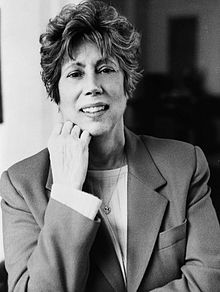Marion Meade
| Marion Meade | |
|---|---|
 |
|
| Born |
January 7, 1934 Pittsburgh, Pennsylvania |
| Occupation | writer, novelist |
| Nationality | United States |
| Genre | biography |
| Notable works | Dorothy Parker: What Fresh Hell Is This? |
Marion Meade (born January 7, 1934) is an American biographer and novelist. She is best known for her portraits of literary figures and iconic filmmakers.
Born in Pittsburgh, the eldest of three children, Meade grew up in an academic environment. Her father, Surain Singh Sidhu, a Sikh immigrant from Amritsar, India, taught physics at the University of Pittsburgh. Her mother Mary, a Hungarian-American, was a homemaker whose hobbies included writing song lyrics and raising orchids. Meade first became interested in journalism while attending Bethel Township High School where she edited the school paper and worked summers on a local newspaper.
Meade studied journalism at Northwestern University, graduating in 1955. The following year she moved to New York, earned a master's degree from the Columbia Graduate School of Journalism, and found her first reporting job as an assistant to Earl Wilson, the popular Broadway columnist for the New York Post. She subsequently worked for publications in New York and Washington before becoming a freelancer and publishing articles in the New York Times, The Nation, The New Republic and McCall's.
Meade’s first book, Bitching, published in 1973, stemmed from her involvement in the women’s liberation movement of the 1960s. Following her participation in feminist consciousness-raising groups, she asked women of various ages how they secretly regarded the men in their lives. The result was a less than favorable review of the opposite sex.
Following Bitching, Meade wrote a trilogy of feminist-themed works set in medieval France. Eleanor of Aquitaine chronicles the life of the powerful 12th-century queen. Stealing Heaven: The Love Story of Heloise and Abelard retells one of the most famous love stories of European history (a film adaptation of the novel was released in 1988). A second novel, Sybille, concerns the death of literature during the Albigensian Crusade and a 13th-century troubadour grappling with her verse as her homeland collapses.
...
Wikipedia
